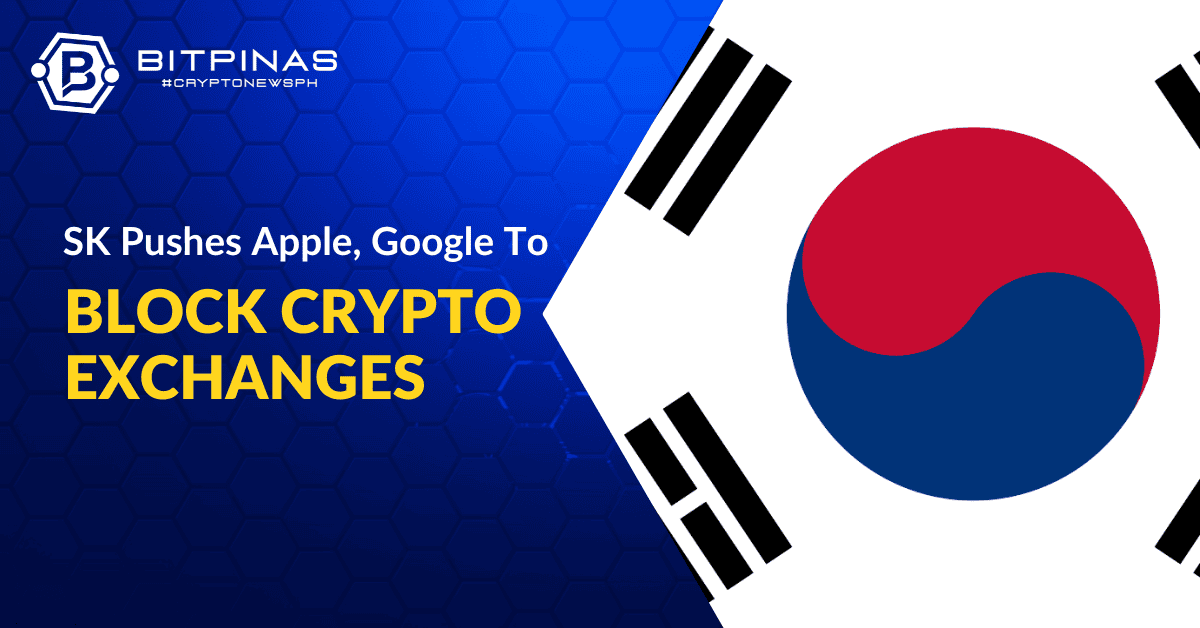The Korean Financial Intelligence Unit (KoFIU), the regulator that oversees the prevention of money laundering, terrorist financing, and the transparency of financial transactions in South Korea, confirmed that it ordered the Apple App Store and the Google Play Store to ban 11 and 17 international centralized crypto exchanges (CEXs), respectively.
According to KoFIU, the ban stemmed from these foreign virtual asset operators conducting undeclared business for Koreans.
“In order to prevent damage to users, such as information leakage caused by transactions with undeclared businesses, the government is promoting the blocking of domestic access to internet sites and mobile phone apps of overseas undeclared businesses.”
Korean Financial Intelligence Unit
In a 2024 study by South Korean research company Gallup Korea, 75% of South Koreans use Android smartphones (69% use Samsung and 5% use LG Electronics), which use the Google Play Store. Meanwhile, 23% of South Koreans are iPhone users, who use the Apple App Store.
This means that around 98% of South Koreans were affected by the ban.
Banning these CEXs’ mobile applications means South Koreans cannot download them anymore, while those who had already downloaded the applications before the ban was imposed cannot download any future updates of the CEXs’ platforms.
CEXs Blocked on Google Play Store
Advertisement

On March 25, 2025, KoFIU announced that, upon its request, Google LLC blocked domestic access to the apps of 17 foreign virtual asset operators starting that day.
“The enforcement of blocking domestic access to the Google app by undeclared overseas operators is expected to greatly help prevent money laundering using virtual assets and prevent damage to domestic users in the future.”
Korean Financial Intelligence Unit
The 17 unregistered crypto exchanges that were blocked by the Google Play Store under South Korean regulation are KuCoin, MEXC, Phemex, XT.com, Bitrue, CoinW, CoinEX, ZoomEX, Poloniex, BTCC, DigiFinex, Pionex, Blofin, Apex Pro, CoinCatch, WEEX, and BitMart.
CEXs Blocked on Apple App Store
On April 11, 2025, KoFIU announced that, upon its request, Apple Inc. blocked domestic access to the apps of 14 foreign virtual asset operators starting that day.
“Overseas virtual asset business operators who wish to engage in domestic business activities must report to the Financial Intelligence Unit in advance (§6(2) of the Specified Financial Information Act) in accordance with the Act on the Reporting and Use of Specified Financial Transaction Information.”
Korean Financial Intelligence Unit
The 14 unregistered crypto exchanges that were blocked by the Apple App Store under South Korean regulation are KuCoin, MEXC, Phemex, Bitrue, CoinW, CoinEX, ZoomEX, Poloniex, BTCC, Blofin, CoinCatch, DOEX, WEEX, and BitMart.
What’s Next for South Korea’s Crack Down on CEXs
According to KoFIU, it will continue to block domestic access to mobile applications and internet sites of undeclared virtual asset operators abroad after consultation with related organizations.
The regulator also reminded international entities that unreported business activities are subject to criminal penalties, including imprisonment of up to five years or a fine of up to 50 million won.
“When dealing with undeclared businesses, (1) they may be exposed to risks such as personal information leakage and hacking, and there is a risk that they will be abused as a money laundering channel because they are not managed and supervised to prevent money laundering, and (2) undeclared businesses are not supervised by financial authorities and are not subject to user protection systems such as separate storage of deposits, so there is a high risk of damage to users’ money and virtual assets.”
As of April 11, 2025, KoFIU said it has observed 28 virtual asset businesses that have been reported for operating in the country.
Possible Effects on PH Regulation
If there are similarities between the crypto regulations of South Korea and the Philippines, it is the blocking of unregistered CEXs’ platforms.
However, unlike South Korea, the Philippines has only blocked the websites of unregistered CEXs in the country, not their mobile applications.
One prime example is Binance, when the National Telecommunications Commission took the request of the Securities and Exchange Commission and told internet service providers in the country to block the Binance website, specifically https://binance.com, at the end of March 2024.
Meanwhile, a month after the website blocking, Atty. Paolo Ong, the officer in charge of the SEC Philifintech Innovation Office, said in an interview that the regulator was already working to shut down the Binance app.
As of this writing, there is still no update on this move.
However, with the will of the South Korean regulator to ask the Google Play Store and Apple App Store to block unlicensed crypto exchanges in their country, the Securities and Exchange Commission of the Philippines could consider doing the same.
This article is published on BitPinas: South Korea Successfully Pushes Google and Apple to Block 28 Crypto Exchanges, Affecting 98% of Users
What else is happening in Crypto Philippines and beyond?



